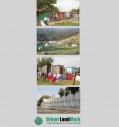Water security & the global water agenda: a UN-Water analytical brief
This analytical brief serves as a starting point for dialogue on water security in the United Nations system. Through this brief, UN-Water aims to capture the constantly evolving dimensions of water-related issues, offering a holistic outlook on challenges under the umbrella of water security. It highlights the main challenges to be addressed, the role water security plays in policy agendas and possible options for addressing water security challenges. The paper stresses that water security needs to be included in the formulation of the Sustainable Development Goals (SDGs).




